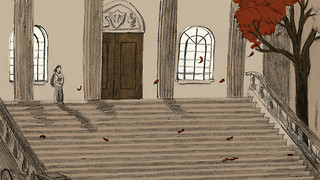Labour needs to cultivate a better relationship with Britain’s farmers
Labour could drastically help Britain’s farmers, argues Lily Alford, if they can learn about each other

The announcement of the new Labour budget last week was met with outrage from British farmers across the country. While their anger is directed at the new inheritance tax relief cap, the backlash responds to something more deep-rooted in the farming community: their sense of disenfranchisement from mainstream politics.
As the daughter of a multigenerational farmer, I have met few people at university who have understood the precarious foundations of my otherwise ‘idyllic’ upbringing, or the necessity of regenerative agriculture in our fight against the climate crisis. This ongoing debate about the budget has revealed both the ignorance of the urban educated left regarding farming and farmers’ disinformation about the potential of left-wing politics to ensure their future.
In the new budget, Rachel Reeves introduced a policy that lowers inheritance tax relief on agricultural assets from complete cover to a cap at £1 million. While the Labour government has stated that these changes will only affect 2,000 estates, the National Farmers’ Union (NFU) have condemned the policy, with the ex-NFU chief claiming that it will directly affect seven out of ten farms.
“The response from farmers has its roots in a long-standing sentiment of disenfranchisement”
Indeed, the policy is not really directed at small or medium family farms. It is directed at ‘gentleman’ farmers, such as James Dyson, who owns 36,000 acres of farmland for which he faces no inheritance tax liability under the current system.
However, there are grounds for concern over the potential impact on the average working farmer too, due to the perilous nature of farm work. The farmers who are invisible to you, whose lives you will only touch when you make the choice to spend a bit more money on British produce in the supermarket. The farmers who consistently face higher risk of fatal injury, mental illness and suicide than the national average across all industries.
In theory, however, the new tax system should continue to protect small farming families, who work the land that they own and have financial planning in place in the case of accident or illness. Minister for Environment, Steve Reed, has concurred with the Chancellor that the vast majority of farmers will not be affected at all, blaming misleading headlines for creating disproportional backlash to the tax.
While the media has certainly played a part in whipping up discontent, the response from farmers has its roots in a long-standing sentiment of disenfranchisement, where farmers feel that they are not represented in the political system. Across the paper manifestos that were distributed in my mixed urban-rural constituency, only the Conservative candidate made reference to farming, and ultimately went on to win the seat.
“If we want the British countryside to survive as we know it, both farmers and the urban Left must seek solutions together”
This was a common theme across the country, although the success of the Green Party in North Herefordshire and Waveney Valley shows that genuine engagement between the Left and rural voters is possible. However, Labour’s focus on the urban workforce often leads to a sentiment that they cannot, and will not, properly represent farmers.
The Conservatives have not represented farmers’ interests either. Just like the rest of the country, British farmers were promised favourable terms which have not come to fruition, failing to mitigate the impact of losing the EU subsidies that kept many farms afloat prior to 2017. Aside from some successful organic and regenerative agricultural schemes, the Conservative party emphasises big agrobusiness, and dishes out indiscriminate tax relief that only allows big landowners to hoover up more land. This is the issue that Labour sought to address in its budget, however their failure to connect with the farming community has led to the tax’s perception as an attack on an already-struggling sector.
Rather than allowing farmers’ backlash to the so-called ‘tractor tax’ to reinforce this sentiment of disenfranchisement, Keir Starmer must therefore build a relationship with farmers that allows them to engage with the aspects of left-wing politics that serves them as working people.
The main issue is that small family farmers may not have sufficient pensions or insurance to mitigate the potential impact of the new inheritance tax relief cap. Together, Labour and the NFU should increase farmers’ access to pensions and insurance schemes, by negotiating better terms with insurance companies and cooperatives that respond to farmers’ cash-poor lifestyles. This would allow for Labour’s agricultural policy to set a precedent for a fair, logical taxation system in the agricultural sector, and also pave the way out of farmers’ disenfranchisement.
The budget’s new policy and its backlash therefore shine a light on how farmers are misunderstood, and also misunderstand how to best help themselves. If we want the British countryside to survive as we know it, both farmers and the urban left must seek solutions together.
 Features / Should I stay or should I go? Cambridge students and alumni reflect on how their memories stay with them15 December 2025
Features / Should I stay or should I go? Cambridge students and alumni reflect on how their memories stay with them15 December 2025 News / Dons warn PM about Vet School closure16 December 2025
News / Dons warn PM about Vet School closure16 December 2025 News / Cambridge study finds students learn better with notes than AI13 December 2025
News / Cambridge study finds students learn better with notes than AI13 December 2025 News / SU reluctantly registers controversial women’s soc18 December 2025
News / SU reluctantly registers controversial women’s soc18 December 2025 News / News In Brief: Michaelmas marriages, monogamous mammals, and messaging manipulation15 December 2025
News / News In Brief: Michaelmas marriages, monogamous mammals, and messaging manipulation15 December 2025









